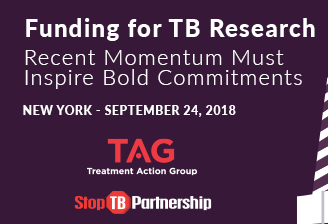
A new brief from Treatment Action Group shows that global funding for TB research reached a new high of USD $767.8 million in 2017.
New York – September 24, 2018: In advance of the first-ever United Nations High-Level Meeting on Tuberculosis (TB), a new brief from Treatment Action Group (TAG) — Funding for TB Research: Recent Momentum Must Inspire Bold Commitments — shows that global funding for TB research and development (R&D) reached a new high of USD $767.8 million in 2017. This marks the second year in a row that funding for TB research exceeded $700 million. This positive trend should encourage heads of state and government convening in New York for the UN High-Level Meeting to commit to reaching even more ambitious financial targets moving forward.
“After years of stagnation, funding for TB research is showing some movement in the right direction, but is still far from the necessary $2 billion per year, so we can’t coast on this recent momentum,” commented Lucica Ditiu, executive director of the United Nations-hosted Stop TB Partnership. “Heads of state and government must make decisive commitments to increase funding for TB research at the High-Level Meeting, and we will continue measuring regularly and openly our achievements, or we risk squandering the opportunity to turn these two years of higher funding into the start of a new era for TB R&D.”
The findings summarized in the brief released today represent preliminary results from an annual global survey of TB research funders conducted by TAG with support from the Stop TB Partnership. The survey, now in its 13th year, is the longest running and most comprehensive record of public, philanthropic, private, and multilateral institutions’ contributions to TB research each year.
Final numbers and accompanying analyses will be available in the forthcoming report TB Research Funding Trends, 2005–2017 in December 2018.
“The UN High-Level Meeting must result in a new consensus that TB research is a moral imperative and a shared, global responsibility,” said Mark Harrington, TAG executive director. “Over 60 percent of TB R&D funding comes from the public sector, so government action is critical. TAG is calling on all governments to step up their investments in TB R&D by contributing their fair share. If each country spent just 0.1% of its overall expenditures on research and development on TB research, we could fill the current funding gap.”
New Zealand, the Philippines, and South Africa laudably met their 0.1% targets, but most countries did not. Even the United States government, the largest funder of TB R&D globally, must give an additional $135 million annually to satisfy its fair share. As UN member states finalize preparations for the UN High-Level Meeting, TAG calls on political leaders to ensure that the meeting results in ambitious commitments to support R&D necessary to end this deadly disease.
Source: TAG